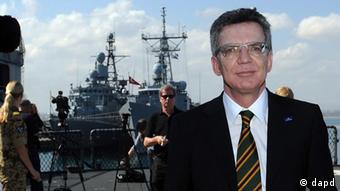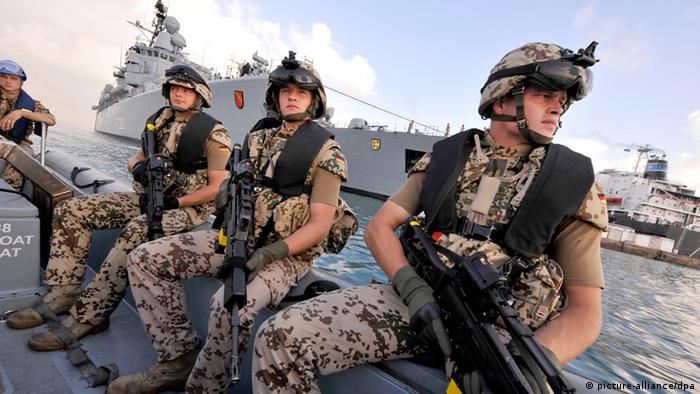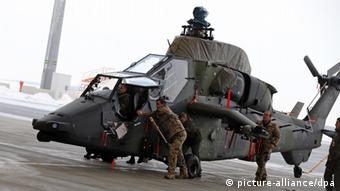The reform of the German military is the most radical overhaul of the Bundeswehr in its history. New challenges such as international terrorism and global cooperation require a smaller, more flexible troop structure.
The time of planning, guidelines and draft projects is over. That's the conclusion that a report on a reform of the Bundeswehr, the German military, arrived at. The findings were presented by Defense Minister Thomas de Maiziere on Thursday (16.05.2013). The time has come to change the German military, the report said.
It is the first look at the Bundeswehr reform process, two years since the first changes were introduced. Having been transformed from a conscription-based force to a professional army, the Bundeswehr is to get in shape for dealing with new forms of military threats as s well as a changed demographic and financial context.
A modern employer
The changes were introduced already in 2011 when at the beginning of July, the obligatory military service was axed in favor of a professional army. Two years later the Defense Ministry said it is happy with what's been achieved so far. There are still high figures of people quitting the army: One in four soldiers leaves the job early. But the minimal requirement of 5,000 volunteers had never been in jeopardy, the report said. Currently, there are about 10,000 men and women who voluntarily do up to 23 months of military service.
But in coming years, with fewer people being born in Germany, it will grow increasingly difficult for the Bundeswehr to achieve its recruitment goals. According to the defense minister, the military will have to become a more attractive employer.
"We will never be as good as some others, but we have to become better than we are," de Maiziere said at a conference. Amongst the things that need improving is the family-friendliness - currently there are five new kindergartens being built as well as day care conditions improved.
New, different challenges
All in all, the reforms are going according to plan. Structures have to be slimmed down to reach the target of a smaller professional army. In future, the are to be no more than 240,000 soldiers and civilians employed by the Bundeswehr. That means the number of soldiers will be cut down to 180,000 while some 31 facilities and bases are to be shut down. De Maiziere justified the cuts with a new type of threat the military has to be able to respond to. "It is more likely the Bundeswehr will in future be employed in areas of crisis and conflict around the world than in defending the country."
Germany, he said, was surrounded by friendly nations and had become a "normal European" power, de Maiziere said. Instead of conflicts between states, terrorist networks, failed states, weapons of mass destruction and civil wars will become the new threats to safety and stability. This also means that investments into the military are being reviewed. Large military equipment like tanks and fighter jets will need to be reevaluated. A new field will be a division for strategic intelligence (KSA) to launch attacks via the Internet. The Bundeswehr would thus be able to join the cyber war with computer worms and viruses.
Smaller, more flexible units
The goal of the restructuring is that the Bundeswehr will remain to get the soldiers prepared for their new array of challenges. That includes aid in areas of catastrophe, fighting international terrorists, evacuation of German citizens and international employment as part of EU or UN missions - a new focus that requires a restructuring of the troops into smaller, more flexible and better trained units.
Cooperation with other countries' forces will also need to be improved so that missions like the one in Afghanistan or the anti-piracy mission off the horn of Africa can be done in close and effective cooperation with the international partners.
Still a defensive army?
The Bundeswehr wants to be able to send out some 10,000 troops in up to two concurrent missions. In addition to that there are to be troops ready for rapid intervention missions led by NATO or the EU. For those goals, some 50,000 soldiers would be needed.
Peace activists criticize the overhaul of the troops as they see it as a move away from a defensive to an intervention army. For de Maiziere this though is unjustified criticism as it's more about better international cooperation. Barring changes to the national security situation, the Bundeswehr restructuring is to be completed by 2017. dw de




No comments:
Post a Comment